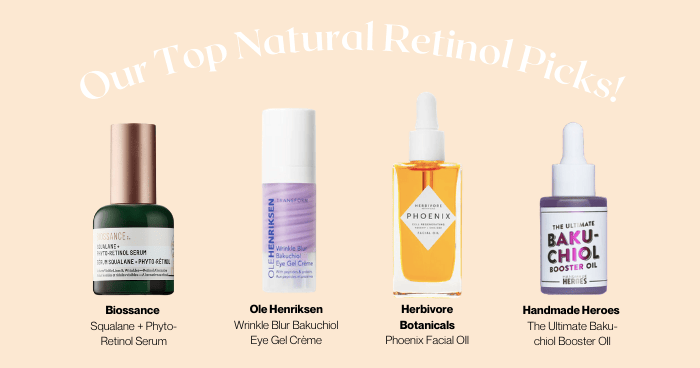Rambutan, bakuchiol, rosehip oil—do they really work?

Anna Efetova | Getty Images
When it comes to skincare, retinoids are king. There are no other active ingredients—natural or synthetic—quite like them. “Retinoids are a family of compounds derived from vitamin A, and the most commonly used one over the counter is retinol,” Joshua Zeichner, a dermatologist based in New York City, says. The powerhouse ingredient has the ability to stimulate collagen and promote cell turnover, which can improve the appearance of fine lines, wrinkles, dark spots, and acne. The miracle of it all, however, comes at a cost—red, dry, and flaky skin.
“In the COVID era where people are wearing face masks, there is less tolerance now more than ever,” Zeichner says. “I think that’s why the idea of retinol alternatives has been growing over the past year and a half.” Because of the irritation factor, retinol has given rise to another trend: natural alternatives like rosehip oil and bakuchiol.
There are a few reasons you might want to consider a natural retinol alternative: if you have sensitive or reactive skin, or just want a clean product that still delivers on most of retinol’s promises. But not every plant or natural ingredient can compete with synthetic retinol, let alone be safe enough to put on our skin.
RAMBUTAN
Kendra Butler, founder of Alpyn Beauty, just launched a new retinol serum that needed to meet the criteria of addressing fine lines and wrinkles, and improving skin elasticity and tone, while coming from a plant. Butler, who harvests most of the ingredients in her skincare line from her backyard in Jackson Hole, Wyoming, created the serum for those with irritation-prone skin. The star of the new serum is rambutan, a tropical, edible plant that comes from the same family as a lychee. (Obviously, this was not a backyard find.)
“Retinol is a phenomenal and effective ingredient, but it’s not for everyone, as it has been known to cause some skin sensitivity and dryness, and isn’t recommended for those who are pregnant and breastfeeding,” she explains. “The literature I read on rambutan was extremely impressive in terms of its performance in wrinkle reduction and elasticity improvement.”
What makes the lychee-related plant so effective is the extract from its leaves that support the natural production of collagen, increase skin elasticity, and reduce the appearance of wrinkles. “The serum provides instant firming and tightening as it works on fines lines and wrinkles,” Butler says. “And it’s incredibly hydrating, thanks to niacinamide, while working on pore reduction and brightening skin.” The serum is pregnancy safe and can be used both day and night.

BAKUCHIOL
The other downside to traditional retinol is that it causes sensitivity to the sun. This is where bakuchiol comes in. “Bakuchiol does not have a sun-sensitizing effect like retinoids do,” Zeichner says. “Being a botanical extract, bakuchiol is appealing to many consumers looking for natural skincare ingredients.”
A botanical extract derived from the psoralea corylifolia (babchi) plant, bakuchiol is rich in antioxidants and anti-inflammatories. “It is structurally different from retinol and works through different sets of receptors in the skin, but it does have a collagen-stimulating and cell-turnover benefit without causing skin irritation,” Zeichner adds.
When compared to the results of traditional retinol, bakuchiol came pretty close to identical in its way of addressing aging, according to a British Journal of Dermatology study. Now, the ingredient has popped up in eye creams, moisturizers, and face oils, so there’s no wrong way to incorporate it into your routine.
ROSEHIP AND CARROT SEED OIL
Retinol is a vitamin A derivative, so it makes sense that there are natural oils also rich in the vitamin, like rosehip and carrot seed. Rosehip oil is exceptional in regenerating and healing the skin, while increasing collagen production and skin elasticity. Similarly, carrot seed oil promotes cellular turnover. An added benefit of both oils is that they are high in antioxidants to fight free radicals.
No matter which natural retinol alternative you choose, keep in mind that each type varies in strength and side effects. “My best advice is to find the right ingredient for your particular skin need,” Zeichner says. “What works for your best friend might not work or be the best option for you.”
– – – – –
This article originally appeared on harpersbazaar.com



